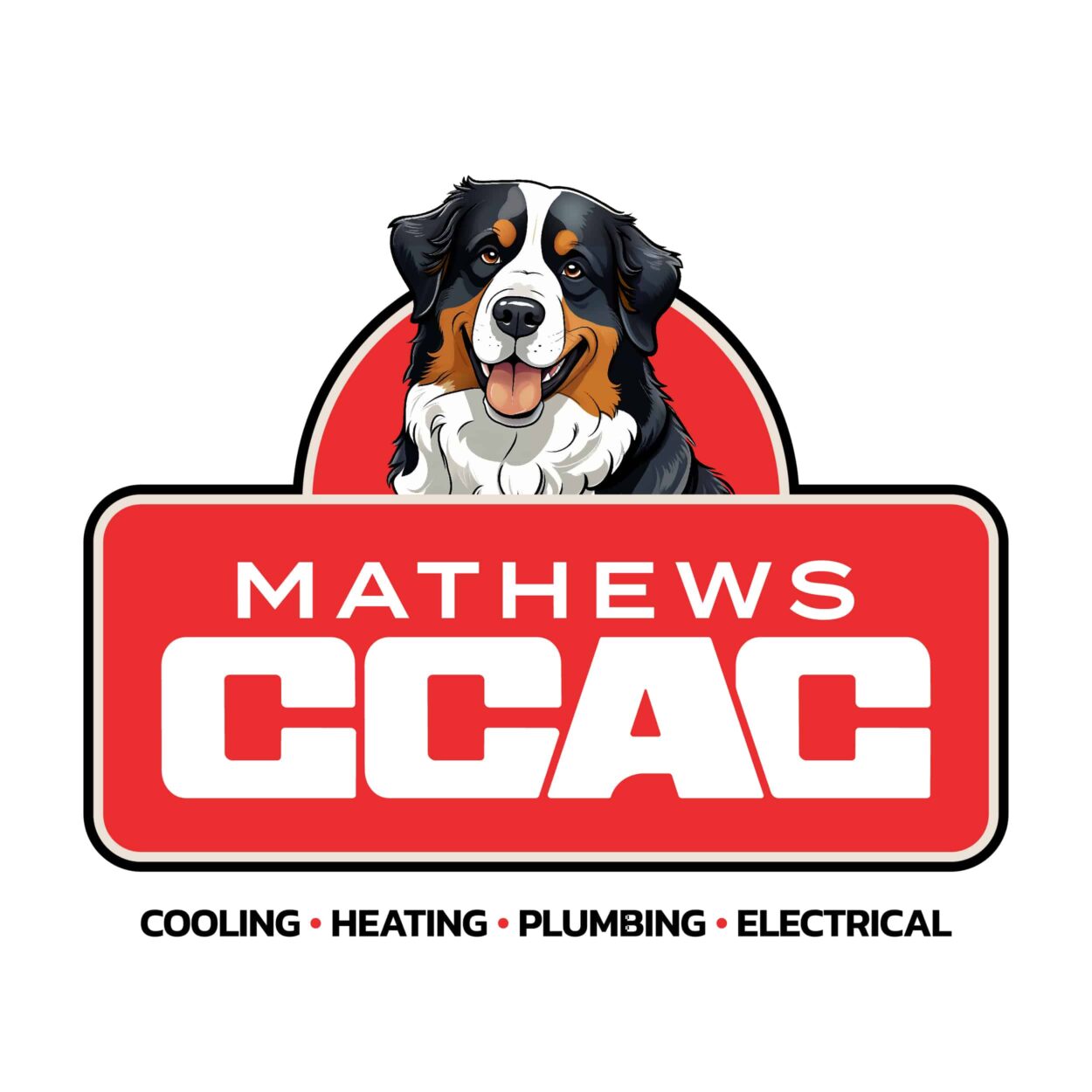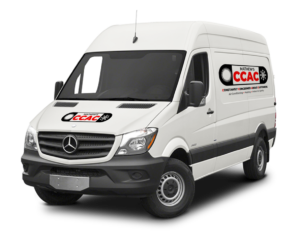HVAC Questions We Receive Often

AC Repair
Why is my AC running but not cooling?
If you’re experiencing this problem, first check that the thermostat is set correctly and that no circuit breakers are tripped. If so, your AC’s condenser coils may be blocked or dirty, preventing it from cooling properly. Check your filter and change it if it’s dirty, then remove any debris from around the outdoor unit. Contact CCAC if the problem persists after this.
What do I do if my AC freezes?
If your AC freezes, turn your thermostat OFF and your fan ON, and make sure your filter isn’t dirty, as dust and debris on the coils is the reason an AC freezes. Turning the fan on will help circulate warm air through the system and thaw the ice on the coils. While you wait the several hours it takes to thaw out, consider going to the pool or the movies to stay cool while the fan does its work.
Once the coils are thawed, you can turn your AC to its normal settings again, but call a trusted HVAC company if your AC freezes more than once.
Is it bad for an AC to run constantly?
It’s normal for your AC to cycle more frequently during the summer to maintain a comfortable temperature in your home. However, your AC should be running constantly. If you notice that your AC seems to be in one long cooling cycle, contact Mathews CCAC for AC repair.
What happens if your AC isn’t serviced?
When there’s a problem with your AC and you don’t have it serviced, it wears on your system and has several negative benefits for you. The added strain an unaddressed repair places on the whole system will make your energy bills rise and may even cause more issues within the system. Not only will this cost you more money on repairs, but it will also make your AC less efficient.
If you notice a problem with your air conditioner, don’t wait — call on Mathews CCAC for AC repair as soon as possible.
AC Installation
Can I install my own air conditioner?
Technically, you can do any home project yourself, but that doesn’t mean you should. One of the leading causes of early AC replacement is an incorrectly installed system, especially in cases where ductwork needs to be replaced as well. This is because it takes a lot of skill and experience to install an air conditioning system, and you get what you pay for. Only a licensed, experienced HVAC team should be trusted with something as important as AC installation and replacement.
When should I replace my AC unit?
Air conditioners last about 10-15 years, so you should start monitoring yours for signs that it needs to be replaced once it’s 10 years old. Your AC may need to be replaced if you notice:
- Frequent, costly repairs
- Steadily rising energy bills
- Visible damage to the unit
- Strange noises or odors
- A complete system breakdown
If these signs sound familiar, contact Mathews CCAC for an inspection from one of our expert technicians. We’ll be able to tell you if your system is on its last leg and help you prepare to replace it.
Where should my AC be installed?
Ideally, an air conditioning unit should be installed on the Northeast side of your home so that the house will shade it during the hottest part of the day. However, you should aim to install your outdoor AC unit in a secure location that won’t get in your way.
How long does it take to install an AC?
Generally, an AC installation takes four to eight hours. This can vary depending on the size of the installation team and the complexity of the installation. If new ductwork must also be installed, the process can be much longer.
AC Tune-Up
What does an AC tune-up include?
By the end of an AC tune-up, your air conditioner should be clean and running as efficiently as possible, prepared for summer. A quality AC tune-up includes:
- Cleaning and inspections of the coils and fan
- A refrigerant level check
- Calibration of the thermostat
- An inspection of all electrical connections and components
- A blower motor inspection
Your tune-up technician will also catch any unnoticed issues with your system and recommend repairs. If possible, they should make repairs during the same visit.
Is an AC tune-up worth it?
While tune-ups might sound like a sales trick, they’re very important to the short-term and long-term health of your air conditioner. Having your AC tuned up regularly has many benefits, including:
- Maintaining high efficiency (and lower energy bills)
- Catching repairs before they cause more problems
- Reducing the risk of breakdowns
- Extending the life of your AC
How often should my AC be tuned up?
You should schedule a tune-up for your AC system every spring before it gets too hot. This way, your AC will be ready to take on the extra strain of a Texas summer with no issues.
What can I do to maintain my AC?
The best preventative maintenance you can do on your AC is to change the filter every couple of months, more if you have shedding pets. You should also keep debris such as leaves, twigs and dirt out of your outdoor unit as much as possible. Beyond these simple tasks, schedule a tune-up each spring to take care of your AC.
Indoor Air Quality
What is indoor air quality?
Indoor air quality, or IAQ, is the combination of humidity and pollutant levels in your home’s air. It’s important to ensure that your home has good IAQ to prevent health issues due to exposure to poor air quality. Short-term exposure to poor IAQ can cause allergy-like symptoms such as itchy eyes, a runny nose and headaches. Long-term exposure can lead to respiratory diseases such as asthma and even cancer.
What are common indoor air pollutants?
Here are some common indoor air pollutants:
- Mold and other biological pollutants
- Dust and other indoor particulate matter
- Secondhand tobacco and wood smoke
- Gas from appliances
- Asbestos
- Carbon monoxide
- Lead
- Radon
- Pesticides
- Nitrogen dioxide
- Volatile organic compounds (from chemical cleaners)
Can plants improve indoor air quality?
Yes. While they’re not as effective as air purification systems, plants are natural air purifiers that also serve as home decor.
How can I improve my indoor air quality?
There are several things you can do to improve your home’s IAQ:
- Clean often, especially if you have pets that shed.
- Change your HVAC filters every couple of months or more.
- Invest in an air purifier.
- Allow fresh air into the home by opening windows on days with good outdoor air quality.
- Get some indoor plants. Note: Improperly taken care of plants can foster mold growth.
Ductless AC
Are ductless AC units more efficient than central AC?
Typically, ductless air conditioners are more efficient than central cooling. This is because ductless cooling skips the process of distributing conditioned air via ductwork, which can raise the temperature of the air via heat transfer. Ductless systems also operate more efficiently overall, with higher SEER ratings than central ACs being most popular.
However, your home’s cooling needs will determine what the most efficient solution for your home is. Ask an experienced HVAC technician if ductless is the best option for you.
Can I install ductless myself?
One of the many benefits of ductless air conditioners is a fast and easy installation. They require only a small hole in an exterior wall to connect the indoor and outdoor units. If you’re a savvy DIYer wanting to take on the installation of a single mini-split unit, the project is doable. However, we recommend that homeowners without DIY experience and those installing more complicated ductless systems hire a professional, licensed HVAC technician to ensure the job is done correctly.
How long do mini-splits last?
Ductless mini-split air conditioners can last 10-30 years if taken care of properly with regular maintenance. This is much longer than central ACs, which last 10-15 years.
Are mini-splits cheaper than central air?
The cost of a ductless AC system and installation is more expensive upfront than that of a central air conditioner. However, ductless ACs start paying for themselves immediately with lower energy costs due to their high efficiency. They also typically last much longer than central air conditioners, which means you’ll save money by not having to replace your ductless system so soon.
Heater Repair
Why would a heater suddenly stop working?
There are several possible reasons your furnace would stop working suddenly. The most common is that there’s dust and debris on the blower, which causes the heater to overheat and stop working. A dirty air filter can also cause your heater to stop working by blocking the airflow. It’s important to have your furnace tuned up yearly to prevent dirt buildup like this from causing issues with the heating system.
Other less common sources of a suddenly broken down heater include:
- Thermostat issues
- A dead blower capacitor
- Low refrigerant levels
- Ductwork problems
What do I do if my heater is blowing cold air?
If your heater is on but blowing cold air, there’s a problem with the heating component, not the fan. If you have a gas heater, turn the heater off and on. If the air around it gets warm and then cold, you likely have a problem with the flame sensor. Call on the HVAC experts at Mathews CCAC for heater repair if you experience this problem, whether you have an electric or gas furnace, as the problem is typically not fixable on your own.
Heater Replacement
Can I replace my furnace myself?
Unless you’re a licensed, experienced HVAC technician, you should never try to repair or install a furnace. Not only is it a complicated and difficult process, but it can also be dangerous if you don’t have the proper skills. Call on the trusted experts at Mathews CCAC to guide you through the heater replacement process and take care of the labor for you.
How do you know if your furnace is dying?
When you know what to look for, it’s easy to tell when your heater is at the end of its life. Look for these signs:
- Increased heating bills
- Visible damage to the system
- Strange noises and odors
- A yellow burner flame (for gas furnaces)
- Dry, dusty air inside your home
If you notice any of these signs, have the professionals at Mathews CCAC take a look at your system and recommend the best course of action.
Is a new furnace worth it?
If your furnace is at the end of its life, getting a new one is very important. Rather than pouring money into frequent repairs, investing in a new furnace reduces the number of repairs it will need, lowers your energy bills and protects you from unexpected breakdowns. Don’t wait to shiver in the cold with a broken furnace — start the heater replacement process now.
Heater Tune-Up
Is a heater tune-up worth it?
While tune-ups might sound like a sales trick, they’re very important to the short-term and long-term health of your heater. Having your furnace tuned up regularly has many benefits, including:
- Maintaining high efficiency (and lower energy bills)
- Catching repairs before they cause more problems
- Reducing the risk of breakdowns
- Extending the life of your furnace
How often should my furnace be tuned up?
You should schedule a tune-up for your heating system every fall before it gets too cold. This way, your heater will be ready to take on even the coldest winter day with ease, saving you from inconvenient breakdowns.
What can I do to maintain my heater?
The best preventative maintenance you can do on your furnace is to change the filter every month. You should also keep debris such as leaves, twigs and dirt out of your outdoor unit as much as possible. Beyond these simple tasks, schedule a tune-up each fall to take care of your heater.












